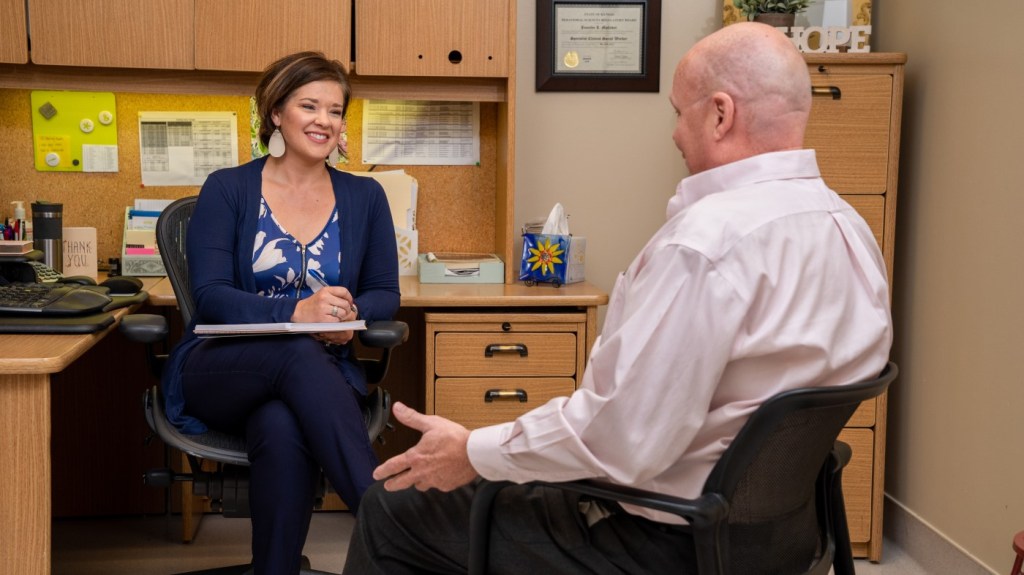
All service members face unique challenges when returning home and transitioning back to civilian life, and our mental health professionals—psychiatrists, psychologists, social workers, and more—are integral to empowering Veterans to take charge of their wellbeing and pursue fuller lives.
Just as our Veterans come from a wide array of backgrounds and experiences, VA’s mental health services adapt to those individual needs. With a plethora of pathways for you to pursue, VA offers unique specializations, as well as unique opportunities to join our team.
Mental health support for new moms
VA mental health providers in Virginia are using telehealth to help new mothers feel less alone. The Women’s Behavioral Health Interdisciplinary Program at VA Hampton Health Care offers mental health services that support pregnant and postpartum Veterans.
About 1 in 7 women experience postpartum depression, which involves feeling extreme sadness, anxiety, and tiredness for extended periods in the year after childbirth. Hampton VA’s services connect Veterans with a VA therapist for individual and group sessions.
“We know that the postpartum period is a heightened period of risk for women to develop depression or anxiety,” explained Dr. Nicole Dutta, a psychology program manager for Women’s Mental Health at VA Hampton. “So, if we can intervene early before they’re having significant symptoms, then we can prevent them from going through that.”
The program’s framework fosters a sense of community and connection among Veterans, as well as providing a safe space for open communication and shared experiences.
“Veterans feel like they’re able to get support and they may feel more comfortable speaking to all women,” Dutta said.
Hope improves mental health
The Hope Recovery Center in the VA Fayetteville Coastal Health Care System is an outpatient program that helps Veterans create satisfying lives. The program is designed to assist Veterans grappling with severe mental illness or posttraumatic stress disorder (PTSD) by providing a therapeutic learning setting.
The program is recovery-oriented, which means that the focus is on helping Veterans to develop skills to feel better, be successful, and have meaningful relationships.
“What we do is Veteran-centric and goal driven, so we allow the Veterans to dictate for themselves the life they want to live,” said Dr. Crystall Matthews-Wells, psychology program manager. “We help articulate those goals and break them down into objectives. And that is our starting point.”
Hope Recovery Center services include social activities, hobby classes, and life skills that focus on independent living and financial wellness. There are also peer led groups, individual psychotherapy vocational services, and family education.
“We want the Veterans to understand that there is life beyond the mental illness or experiences that they suffer from,” said Bianca Johnson, social worker and coach.
Building a mental health career
At South Texas VA, the Licensed Professional Mental Health Counselor (LPMHC) internship program is working to meet the needs of Veterans while also strengthening VA from within. That’s because the program provides a pathway to employment within VA after graduation.
“I’m so proud that out of the 9 students that started our program, 5 have applied and been hired to work here at South Texas,” said training director Tanya Workman. “They’ve been doing so well in their transition to full time employment, even earning their full licensure through the state of Texas. That is a true testament to the program working.”
For many of the trainees, the high-quality program and staff support reinforced their decision to stay with VA.
“What I enjoyed most from the program was the support we got from the entire psychology department, so we always had someone to work with us and we were never alone,” said Payton Bostick, former intern. “It just really fostered my love for working with Veterans, so I wanted to stay with VA and continue my work full-time.”
“This work can be life or death, and we need to be able to trust each other. Our Veterans need that trust and support,” said Workman. “We show them how to speak to Veterans, how to support our Veterans, and how we connect with them. That’s what is most important.”
Work at VA
No matter your focus, your experience providing mental health services will offer Veterans the support they need to live life to the fullest when you join our team.
- EXPLORE mental health jobs at VA.
- LEARN more about our mission of service.
- SEARCH for a VA career near you.


